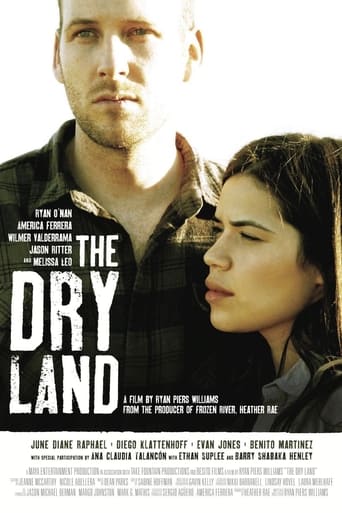SnoopyStyle
James (Ryan O'Nan) returns home to Texas from the Iraq war with memory loss. He suffers from PTSD and roughs up his loving wife Sarah (America Ferrera) in his dream state. His mother Martha (Melissa Leo) is sick. He starts work at the slaughterhouse with his best friend Michael (Jason Ritter). He seeks help after another episode. Sarah leaves him. He visits fellow troubled soldier Raymond Gonzales (Wilmer Valderrama) who leaves his family to join him on a road trip.Relative unknown Ryan O'Nan gets the lead in this movie. I don't dismiss his quiet performance. I would rather Valderrama switch it up with the reserved explosive role. It would be more interesting to see him act outside his comfort zone. O'Nan has an everyman feel and sometimes fades into the background. It's a sincere movie with solid actors doing fine work.
gijoetx45
I am a combat Veteran who was seriously wounded in Baghdad, Iraq on April 26, 2004. I had the opportunity to view The Dry Land at the Dallas International Film Festival in April this year. I think the movie does an excellent job portraying some of the issues that may occur when a combat Veteran comes home. Each one of us has a different experience of war and react differently when we come back home and try to fit back into normalcy. It can be difficult to accept that life back home may be different then prior to our deployment and the fact that our friends and family view us differently too. I think The Dry Land is spot on in every aspect of the movie and I want to thank all of the actors & actresses for their involvement and especially the Director and Screenwriter Ryan Piers Williams.
stuj-894-467035
Yet another Hollywood portrayal of soldiers returning from war as a bunch of drunken psychotic screw ups. This liberal waste of film even includes references to Vietnam just to ram the point home.There isn't really a storyline in the film as it isn't necessary to make it's point. There is never any real dramatic basis for the problems with the character for which we are supposed to feel sorry so it is hard to feel anything.If you are really into this sort of thing, a better film (along the same lines) is "Brothers" which does a better job with the same basic theme.
viewfromhere
Post traumatic stress disorder (PTSD) is the source of many ongoing casualties of war. While not a condition restricted only to actual battle, the disorder has become increasingly well understood, even if not always well diagnosed and treated. The Dry Land explores the deep pain and disorientation that affects returning Iraq war veteran James as he tries to reacquire "normal" life in Texas. James becomes increasingly dysfunctional and desperate in the face of normal life.The melancholic beauty of the film lies in the telling of this story through a highly personal struggle. We experience the effects on James' community of wife, extended family, friends, acquaintances, and others along the way. The horror of war is artfully portrayed without a single flashback to events in military service. This made the movie more effective as a probe into the actual effects of PTSD. We have seen plenty of war footage elsewhere, but not nearly enough of war's effects in day to day lives of the many victims. In reality, we are all the victims of war in one way or another. People like James pay an extremely high price, and our whole society in diminished through all the ripple effects.The Dry Land exposes a reality of war that we all need to consider, and hopefully translate into action. James' family and friends are ineffective in all their efforts to help, the military appears in a reasonable but impotent light, and no answers are proposed. James really struggles alone despite attempts to lift him. Ultimately we likewise must struggle alone in many ways. The ancient Hebrew prophets cry out again and again against violence and injustice. We readily visualize the immediate effects of violence in blood and killing, but the entirety of the toll is much greater and deeper. "But they do not know how to do what is right," declares the LORD, "these who hoard up violence and devastation in their cities" (Amos 3:10). There is a devastation that still comes into our own cities, far from the killing fields of war. Will we ever count the real cost?


